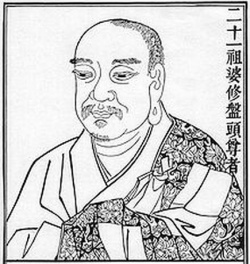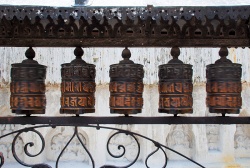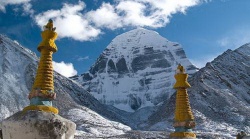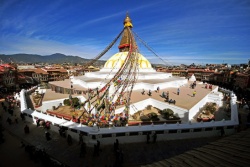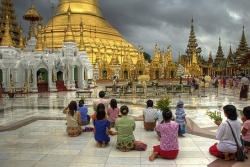Abhidharma-kosa
Abhidharma-kośa (Sanskrit; Tibetan: chos mngon pa'i mdzod; English: Treasury of Abhidharma) is a key text on the abhidharma written in Sanskrit verse by Vasubandhu. It summarizes the Sarvāstivādin tenets in eight chapters with a total of around 600 verses. The text was widely respected, and used by schools of Mahayana Buddhism in India, Tibet, and the Far East.
Vasubandhu wrote a commentary to his own work, called the Abhidharma-kośa-bhāsya. In it, he critiques the interpretations of the Sarvāstivādins and others of the tenets he presented in that work. This commentary includes an additional chapter in prose refuting the idea of the "person" (pudgala) favoured by some Buddhists. However, later Sarvāstivādin master Samghabhadra considered that he misrepresented their school in the process, and at this point designated Vasubandhu as a Sautrantika (upholder of the sutras) rather than as an upholder of the Abhidharma.
Abhidharmakosha
阿毘達磨倶舎論 (Skt; Jpn Abidatsuma-kusha-ron )
See; Dharma Analysis Treasury, The.
==Chapters==
The text includes eight chapters:
| English |
Tibetan |
Summary |
|---|---|---|
| Ch. 1 Categories of Existence |
Gns Dng Po Khms Bsdn Pa |
Classifies existing things into stained and unstained phenomena |
| Ch. 2 Sense Powers |
Gns Gnyis Pa Dbng Po Bstn Po |
Describes how existing things are perceived |
| Ch. 3 The Suffering World |
Gns Gsum Pa 'jig Rten Bsdn Pa |
Describes the different realms and who inhabits them |
| Ch. 4 Karma |
Gns Bzhi Pa Lam Bsdn Pa |
Describes where the world comes from |
| Ch. 5 How Bad Thoughts Motivate Karma |
Gns Lng Pa Phy Rgys Bsdn Pa |
Describes how we come to create the deeds that create our world |
| Ch. 6 How to Escape Suffering |
Gns Drug Pa Gng Zg Dng Lam |
Describes how wisdom can free us from suffering |
| Ch. 7 Wisdom |
Gns Bdun Pa Ye She Bsdn Pa |
Describes more thoroughly the wisdom mentioned in Ch.6 |
| Ch. 8 Balanced Meditation |
Gns Brgyd Pa Snyoms Par 'jug Pa Bsdn Pa |
Describes a Buddha's knowledge |
| Ch. 9 Refutation of the Pudgala |
? |
This chapter is included in Vasubhandu's commentary only; it is not in the root text. |
An alternate English translation of the chapter titles, including the title of the 9th chapter of Vasubandhu's commentary, is:
1: The Dhātus
2: The Indriyas
3: The World
4: Karma
5: The Latent Defilements
6: The Path and the Saints
7: The Knowledges
8: The Absorptions
9: Refutation of the Pudgala
==Translations==
Ancient translations of the Abhidharma-kośa were made into Chinese by Paramārtha (564-567 CE) and by Xuán Zàng (651-654 CE). Other translations and commentaries exist in Tibetan, Chinese and Mongolian, and modern translations have been made into English, French and Russian.
The English translation is:
- Abhidharmakosabhasyam of Vasubandhu, translated by Leo M. Pruden, Asian Humanities Press, Berkeley 1990 (Translated into English from the French translation of Louis de La Vallé Poussin, L'Abhidharmakośa de Vasubandhu, Institut belge des hautes études chinoises, Bruxelles, 1971)
==Commentaries==
There are many commentaries written on this text, including an autocommentary by Master Vasubandhu entitled Abhidharmakoshabhyasa. The First Dalai Lama, Gyalwa Gendun Drup (1391-1474) composed a commentary titled Illumination of the Path to Freedom.
Abhidharma-kośa; Treasury of Abhidharma; ཆོས་མངོན་པའི་མཛོད་་
| bo-Latn=Wylie+: chos mngon pa'i mdzod;
THL+: Ngön Pa Dzö
아비달마구사론
Abidalma-gusaron
阿毗達磨俱舍論 (T)
阿毗达磨俱舍论 (S)
阿毘達磨倶舎論
Abidatsuma-kusharon
:
Abhidharma-kośa (Sanskrit; Tibetan: chos mngon pa'i mdzod; English: Treasury of Abhidharma) is a key text on the abhidharma+ written in Sanskrit+ verse by Vasubandhu+, in the 4th or 5th century. It summarizes the Sarvāstivādin+ tenets in eight chapters with a total of around 600 verses. The text was widely respected, and used by schools of Mahayana+ Buddhism+ in India, Tibet, and the Far East.
Vasubandhu wrote a commentary to his own work, called the Abhidharma-kośa-bhāsya. In it, he critiques the interpretations of the Sarvāstivādins and others of the tenets he presented in that work. This commentary includes an additional chapter in prose refuting the idea of the "person" (pudgala) favoured by some Buddhists. However, later Sarvāstivādin+ master Samghabhadra considered that he misrepresented their school in the process, and at this point designated Vasubandhu as a Sautrantika+ (upholder of the sutra+s) rather than as an upholder of the Abhidharma+.
The text includes eight chapters:
! English
! Tibetan
! Summary
| Ch. 1 Categories of Existence
| Gns Dng Po Khms Bsdn Pa
| Classifies existing things into stained and unstained phenomena
| Ch. 2 Sense Powers
| Gns Gnyis Pa Dbng Po Bstn Po
| Describes how existing things are perceived
| Ch. 3 The Suffering World
| Gns Gsum Pa 'jig Rten Bsdn Pa
| Describes the different realms and who inhabits them
| Ch. 4 Karma
| Gns Bzhi Pa Lam Bsdn Pa
| Describes where the world comes from
| Ch. 5 How Bad Thoughts Motivate Karma+
| Gns Lng Pa Phy Rgys Bsdn Pa
| Describes how we come to create the deeds that create our world
| Ch. 6 How to Escape Suffering
| Gns Drug Pa Gng Zg Dng Lam
| Describes how wisdom+ can free us from suffering
| Ch. 7 Wisdom
| Gns Bdun Pa Ye She Bsdn Pa
| Describes more thoroughly the wisdom+ mentioned in Ch.6
| Ch. 8 Balanced Meditation
| Gns Brgyd Pa Snyoms Par 'jug Pa Bsdn Pa
| Describes a Buddha+'s knowledge
| Ch. 9 Refutation of the Pudgala
| ?
| This chapter is included in Vasubhandu's commentary only; it is not in the root text.
|:
An alternate English translation of the chapter titles, including the title of the 9th chapter of Vasubandhu's commentary, is:
1: The Dhātus
2: The Indriyas
3: The World
4: Karma
5: The Latent Defilements
6: The Path and the Saints
7: The Knowledges
8: The Absorptions
9: Refutation of the Pudgala
Ancient translations of the Abhidharma-kośa were made into Chinese by Paramārtha (564-567 CE) and by Xuán Zàng+ (651-654 CE). Other translations and commentaries exist in Tibetan, Chinese and Mongolian, and modern translations have been made into English, French and Russian.
The English translation is:
- Abhidharmakosabhasyam of Vasubandhu, translated by Leo M. Pruden, Asian Humanities Press, Berkeley 1990 (Translated into English from the French translation of Louis de La Vallé Poussin, L'Abhidharmakośa de Vasubandhu, Institut belge des hautes études chinoises, Bruxelles, 1971)
There are many commentaries written on this text, including an autocommentary by Master Vasubandhu+ entitled Abhidharmakoshabhyasa. The First Dalai Lama+, Gyalwa Gendun Drup (1391-1474) composed a commentary titled Illumination of the Path to Freedom.
